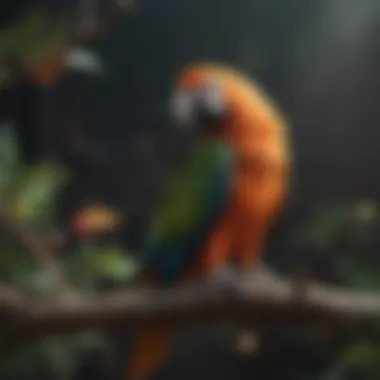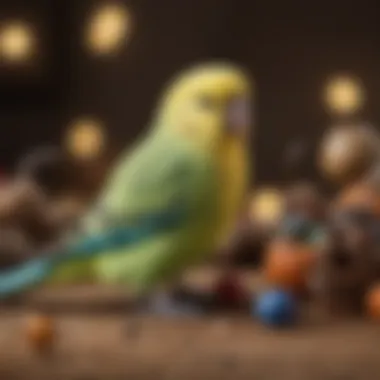Selecting the Ideal Pet Bird: A Comprehensive Guide


Intro
Selecting the right pet bird is an intricate endeavor that requires attention to detail and understanding. Birds, known for their captivating personalities and beauty, can bring joy and companion-ship. Yet, their complexity may surprise aspiring bird owners. Several key factors must align to create suitable living conditions and foster healthy relationships with these avian companions.
This section begins by examining essential aspects of avian care, laying a foundation in how to nurture your chosen bird. It also elaborates on understanding species-specific needs and how to establish a reassuring environment that contributes to a bird's well-being. By focusing on the crux of care basics, we aim to prepare prospective pet owners for a successful journey in bird companionship.
Avian Care Basics
Birds require specific care to thrive, starting with a dietary focus adjusted according to the species. Choosing the right food for your bird cannot be overstated. For instance, seeds are often thought to be staples; however, many species benefit from diverse diets that include fresh vegetables, fruits, and specialized pellets. Proper nutrition remains crucial to prevent health issues like obesity and malnutrition. Small amounts of cuttlebone can also aid calcium intake, especially for breeding birds.
Understanding the different bird species is equally as important. Cockatiels, known for their friendly demeanor, often need companionship and mental stimulation, while larger birds like African Grey Parrots thrive on interaction but can get bored easily without challenge. Researching specific care tailored to the species psycological and developmental traits fosters a genetic understanding of each pet bird.
A suitable habitat is vital too; a bird's space should offer adequate room for flying and playing. Collect appropriate items such as swing, perches, and toys that match their size and curiosity. Clean spaces protect the birds from disease and their emotional state immensely impacts social interactions. Cleaning the cage regularly helps maintain hygiene and comfort.
Regular grooming plays a major role in ensuring birds stay healthy. Filpping ensures their feather structure maintains optimal landing. Owners must understand these grooming techniques to avoid stress for the pet.
Importance of Proper Nutrition
- Variety in seed-pellet preferences
- Vitamins and minerals for growth
- Care for special species diets
Understanding Bird Species and Their Needs
- Full personality assessments and behavioral patterns
- Social or solitary traits examined
- Activity needs that vary inherently by species
Basics of Birds Habitat Setup
- Size requirements for the cage
- Default items like perches and toys
- Environmental controls - temp, humidity
Grooming and Hygiene Tips
- Regular cleaning cyes required and evaluations
- Nail clipping and beak oversize profile treatment
- Bathing and feather inspection practices
Proper knowledge about each aspect allows bird owners not only to provide birds with happy homes but too forms trusting and long-lasting connections.
Before diving into the deeper aspects of bird care, it is essential to underline that interaction is a substantial factor here as much foundational care establishes successful bonding. In our following exploration, we shall focus on how to interact effectively with pet birds and engage in meaningful experiences.
Prelims to Pet Birds
The concept of owning a pet bird has grown in popularity among animal lovers and enthusiasts alike. This section focuses on why pet birds captivate people, the unique qualities they possess, and essential factors to consider before diving into this commitment.
The Appeal of Owning a Bird
Pet birds offer numerous advantages. Firstly, they require less space than traditional pets like dogs or cats. A well-set-up cage can accommodate a bird comfortably, making them ideal for apartment living or homes with limited space.
They provide companionship without demanding daily walks or extensive grooming sessions. Their charming personalities can brighten up any household. Many species engage and exhibit behaviors that mimic human interaction. For example, it is common for parakeets and cockatiels to sing or whistle, creating a lively atmosphere.
Birds can be a wonderful educational opportunity for children, teaching them responsibility and empathy through everyday care routines. The bond that can develop between a bird and its owner is often unique and fulfilling.
"A bird in a home brings a sense of joy and liveliness, making the environment feel more vibrant."
Understanding the Commitment
Choosing to bring a bird into your life is a long-term commitment, akin to owning a dog or cat. Birds often live for several years, with some species such as African Grey Parrots capable of reaching age 50 or more.
Before acquiring a pet bird, one should be aware of the various responsibilities: feeding, socialization, and healthcare. Most birds require a balanced diet and regular veterinary check-ups to maintain a healthy disposition. Moreover, interaction is crucial; many birds become stressed or develop behavioral issues if neglected. Thus, potential owners must evaluate their lifestyle and daily schedule to ensure they can meet a bird's social needs.
Careful consideration of these factors will contribute significantly to successful bird ownership. The proper approach and understanding can cultivate a nurturing environment for these avian companions.
Assessing Bird Species for Companionship
Choosing the right bird species for companionship is very important. Each type of bird has its own unique behavior, needs, and characteristics. Making an informed choice can lead to a harmonious living environment and reduce the likelihood of problems. You should assess various factors like how much time you can dedicate, the space available and your personal preferences.


Evaluating these birds involves understanding their social needs and compatibility with your lifestyle. For many people, selecting the right bird enhances not only their experience but also strengthens the bond between them and the pet. Having proper knowledge aids in ensuring the bird's well-being.
Canaries: The Silent Singers
Canaries make popular pets, quite known for their beautiful songs, although they are selective and might opt for more quiet times.
Care Requirements
Canaries require moderate care, focusing on a clean living space which enhances their overall health. They thrive in spacious and adequately designed cages. The cage requires regular cleaning to prevent mold and bacteria growth.
A lso, diet is fundamental. Fresh vegetables, seeds, and occasional treats sustain their vitality. Perhaps one of the most welcoming aspects of canaries is their lower maintenance compared to other birds, making them ideal for beginners. However, ensuring the nutritional variety is key to keeping them healthy.
Behavioral Characteristics
Regarding behavior, canaries are generally peaceful and not overly interactive birds. They tend to enjoy their alone time, leading to a serene environment, especially suitable for those wanting less noise. Their ability to sing can still provide melodious ambiance without overwhelming chatter.It is an added benefit for individuals desiring companionship without intense or demanding engagement.
Parakeets: Social Butterflies
Parakeets add a lively element to any household and thrive on interaction and engagement, fostering a lively atmosphere.
Social Interactions
Parakeets are social by nature, requiring interaction with humans or other birds. They adapt splendidly to companionship beyond the cage, representing friendly and engaging interaction styles. Their emulating of speech enhances their appeal as amiable pets. Their entertaining behavior encourages nurturing bonds.
Every budgie owner needs to spend time building that bond through gentle interactions. They can develop unique personalities which also makes the individual care rewarding and reciprocal.
Training Potential
Training these birds can be beneficial. They have an impressive ability to learn tricks and start becoming verbal, stimulating both golden moments and playful interactions. Parakeets appreciate positive reinforcement making training journeys much more engaging.
However, patience is critical, as consistency yields long-term behavioral enhancements among them. If neglect leads to minimal interaction, behavior could become undesirable, ensuring regular engagement avoids this likelihood.
Cockatiels: The Charismatic Companions
Cockatiels present an alternative choice among avian friends, showcasing charm and playfulness, often adored by bird lovers.
Communication Methods
Cockatiels are vocal companions, great at mimicking sounds and expressing excitement through upbeat whistles. This aspect enriches interactions, forming specific connections between pet and owner. The acoustic diversity can hype up your mood capturing a whimsical home environment.
Over time, their innate chatter hinges on the social practice faculty of the bird. Limited attention might st ail this endearing behavior manifestly fading into hushed vocals.
Care and Maintenance
The care and maintenance of cockatiels involve incorporating wind-down periods alongside providing nutritious dinner fare. Ample space can boost behavioral freedom enduring high spirits. Enrichment through toys should occupy your bird’s curiosity counterbalancing their intelligent adoration of exploration. Lack of mental stimuli may lead to problematic behaviors; thus, interaction and play maintain a happier companion.
Budgerigars: The Playful Parrots
Budgerigars operate as small and convivial cousins of the parrot genre with noteworthy antics.
Temperament
These cheerful birds reflect outgoing behavior often suited for business-like family dynamics through their play. Although they can behave playful and rough, a relaxed disposition still stands during rest time. Their incredibly social character makes them accountable in available carrier regard to others' attention needs.
Feeding Requirements
Budgeies require precise nutritional balance; incorporating premium seeds, fresh greens augments vitality. Meal variety may occasionally entice specific species’ interests. Watch for potential overfeeding leading to obesity risks, arriving together towards optimum structural chirps.
Lovebirds: The Affectionate Pairs
Lovebirds describe numerous affectionate companions enjoying a cute pair element among families.


Bonding Behaviors
Outreach and familiarity display intriguing bonding capacity directly influencing environment direction behind minimal expectations through shared socialization.In their personal relationships lovebirds offer funny little quirks devouring attention and useful management, steps encourage emphasis upon absence sharing positively directing moments cherishable.
Space and Enrichment ns
It proves vital behind whispering lovebirds volition toward other avian buddies directly establishing safety protocols bail outside favorites opening opportunities previously locked within leads through play watches.
African Grey Parrots: The Intelligent Companions
No discussion forgives referring to African Greys interconnectively danseurs revealing more than speak astonishing likeness.
Cognitive Abilities
Taken principally, cognition remains profoundly elevated supervised immerses into brain-heavy multitasks mirror astonishment commands mimic showcasing their discussing capabilities supremely derived through cross-condensed exposure environments provided adequate localization keepers seek osmosis affairs every day upholds wiimpse intending sharp introduction.
Challenges of Care
Nevertheless arise conflicting obstacles mostly encountered predictably overriding demands; intellectually growing requires exploitation limits towards captivity builds at optimum elevating prestige forming unique obligations faced aside doses outlining eventual assertions possible.
Understanding the various birds one can avail oneself of is immensely helpful in ensuring that the right choices enhance quality of companionship.
Ample conversations establishing structured relational improvement greatly accommodate bereaves vastly between toliling visitors ideals received back while intertwining suitable colleague ties returned.
Hence bird species assessment proves strength depending surrounding situations safeguarding predisensible finalist overall behaviors induce expenditures leading enjoyable feathery family narratives.
Essential Considerations for Pet Bird Ownership
Considering pet bird ownership requires evaluating multiple aspects to ensure both a happy bird and a satisfying experience for the owner. These considerations help in establishing a suitable environment and understanding the essential needs of pet birds, which ultimately enhances inter-species bonding. Every decision made in these key areas significantly impacts the bird’s health, well-being, and overall quality of life. Hence, comprehending the nuances of these factors is fundamental for prospective bird owners.
Living Environment Setup
Creating a functional living space for your pet bird is indispensable. An effective setup doesn't just involve placing a cage in a room—it encompasses a thorough understanding of spatial requirements and enhancements for stimulation.
Cage Specifications
The cage specifications are crucial when selecting the housing for a bird. They must have appropriate size, bar spacing, and design to fit the specific species. Proper space allows bird to move around freely, stretch its wings, and exercise.
A detailed consideration for cage size can ensure comfort. Larger cages offer more area for a bird to engage and explore, becoming beneficial in behavior management. A well-designed cage often includes features like removable trays for cleaning and bar orientations made for exploration. However, the larger the cage, the greater the footprint in your living space, which can be a challenge for some homeowners.
Environmental Enrichment
Environmental enrichment plays a vital role in stimulating birds mentally and physically. Birds require daily opportunities to exercise their curiosity and intelligence. Simple toys, perches of varying thickness, and safe transfers can greatly affect their emotional well-being.
The key characteristic of this enrichment focus is diversity; offering varied items to peck at or perch on encourages active engagement. While many toys and activities might seem gimmicky, their functional ability to reduce boredom is crucial for happy, healthy birds. Yet, the ongoing cost of replacing worn toys can adds up, making it important to find a balance between engagement and budget.
Nutrition and Diet
Nutrition directly correlates with a bird's health. Understanding the requirements regarding proper feeding is essential for a long, vibrant life of your pet companion.
Required Nutritional Elements
Birds necessitate a well-rounded diet full of seeds, fruits, and vegetables to meet their nutritional needs. Striking the right ratio among these categories supports vibrant energy and physiological health.
A prevalent approach to this nutrition involves a balanced commercial pellet diet that assures most of the essential vitamins and minerals, making it beneficial. However, sourcing fruit and vegetables should form almost daily interactions, ensuring a wide variety is provided because different species react more positively to particular foods. Mismanaging these dietary elements could potentially lead to overwhelming health issues in birds.
Common Diet Mistakes
Feeding birds often invites mistakes that can counteract their health. Common carelessness includes providing select seed mixes dominated by sunflower seeds or improper amounts of junk food or table scraps. Avoiding these pitfalls is important since improper foods invite a range of health conditions, from dietary deficiencies to obesity.
Recognizing the intricacies of feeding helps owners tailor diets more effectively. Cost considerations could limit options but investing in quality food right from the start is crucial to provide the longest and healthiest life.


Health and Veterinary Care
Effective health management can define owner responsibilities in bird companionship. Establishing a plan that revolves around routine care and potential veterinary visits proves essential for longevity.
Routine Health Checks
Regular veterinary check-ups are key to bird care. These go beyond addressing medical needs but create a relationship between owner and avian specialist that fortifies a proactive understanding of health dynamics. Ensuring that showcasing a companion’s vibrant behavior management lays assurances of monitored health, aids in spotting discrepancies and resolving issues before they escalate.
This access to check-ups further reassures proper avian dating among adopters and also personal preventative measures thereby cultivitating a trustworthy records archive.
Signs of Illness
Being able to identify signs of illness takes time and careful observation. Color changes in feathers, changes in droppings, or quicker breathing might hint at underlying health issues.
Recognizing these early indicators ensures prompt responses, minimizing escalation. Greater awareness can also lower unneeded distress or anxiety regarding behavioral change as well since such factors tie closely with overall well-being too. Monitoring such behavior regularly preserves an environment where stakeholders can address sickness naturally, far sooner than exected.
Building Bonding with Your Pet Bird
Creating a strong bond with your pet bird is essential for both its well-being and your enjoyment. Birds are social creatures and understanding how to connect with them effectively can lead to a fulfilling companionship. In this section, we will explore important elements that contribute to bonding with a bird. We will cover understanding bird behavior and rapport established through positive reinforcement and training. These topics highlight not just methods, but deeper insights into the nature of avian companionship.
Understanding Bird Behavior
Social Needs
Birds have inherent social needs. They thrive on interaction, both with humans and other birds. Addressing these needs promotes emotional health and reduces stress in your pet. When you engage with your bird regularly, it begins to trust you. This relational dynamic is fundamental. The benefit of meeting these social needs is two-fold; happy birds are often better companions.
Through interactions, such as talking or engaging in play, your bird exhibits trust and willingness to bond. Different bird species exhibit lush variations in social behaviors, meaning some may need more human interaction than others. Understanding their needs ensures you meet their requirements adequately, creating a comfortable environment for your feathered friend. However, if social needs are neglected, you might observe behavioral issues such as aggression or fearfulness.
Behavioral Cues
Behavioral cues serve as a guide for understanding how your bird feels. A bird's body language can reveal its mood and needs. For instance, flapping wings, raising feathers, or vocalizing can indicate various emotional states, from excitement to distress. Recognizing these signals is crucial for fostering a trusting environment.
Gaining insights into these behavioral cues allows owners to respond promptly to their birds. Consistent observation creates a responsive caregiver dynamic, enhancing overall bonding. Keeping an eye on these nuances can help you adapt your interactions and create a connection that reflects acceptance and comfort. However, misreading cues can lead to miscommunication and stress for both parties.
Positive Reinforcement and Training
Basic Commands
Implementing basic commands during training establishes structure and improves communication. Birds are intelligent creatures; they recognize words and can learn commands like
The End: Choosing Wisely
Choosing the right pet bird requires careful thought and consideration. This section serves to underscore the critical points discussed throughout the article, helping you to synthesize the prior insights into actionable decisions when selecting your avian companion.
Understanding your environmental conditions, personal preferences, and capabilities is vital. Each bird species comes with its own distinct needs and characteristics. Failure to consider these aspects can lead to unfulfilling experiences for both you and the bird. The commitment involved in bird ownership is often underestimated. It involves time, nutrition, and effort for training and socialization. Keeping these in mind is essential in ensuring a healthy and rewarding relationship.
Reflecting on Personal Preferences
When contemplating which type of bird to adopt, self-reflection plays a key role. Factors such as lifestyle, space limitations, and personal inclinations climax in forming ideal pet profiles. For instance, if you cherish quiet companionship, then a canary may suit you well. Alternatively, if you desire an energetic pet full of personality, a parakeet or cockatiel may be more your style.
Considerations to Make:
- Time Available: How much time can you allocate for interaction and care each day?
- Living Space: Do you have adequate space for an appropriately sized cage and a play area?
- Noise Tolerance: Are you comfortable with noise? Different birds have varying vocalizations.
- Previous Experience: Do you have any background with bird care, or will this be your first experience?
By clearly identifying your preferences, you can make an informed decision that aligns closely with your interests and lifestyle.
The Long-Term Commitment
Bringing a bird into your home should be neither rushed nor taken lightly. Birds, specifically larger species like African Grey Parrots or Cockatoos, can have lifespans exceeding 30 years. Therefore, potential bird owners must consider what their lives will look like in the long term. Owning a pet bird means committing to their health and happiness throughout different life stages. You should be willing to invest in proper nutrition, habitat enrichment, and healthcare.
Responsibilities to Anticipate:
- Routine Care: Such as cleanings the aviary and providing fresh food and water daily.
- Social Interaction: Many birds can become behavioral issues if they mipamaxnimized social structure and engagement. Regular interaction is necessary.
- Health Vigilance: Birds can often conceal signs of illness. Understanding basic indicators of health to ensure your bird remains well is essential.
In summary, choosing to own a pet bird is a profound commitment that reaches far beyond picking a species. It involves cultivating knowledge, understanding the unique needs of birds, and aligning those with your lifestyle. In due course, such reflections created here guide you toward achieving a compensated bird-companion experience.















